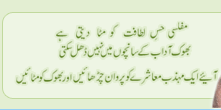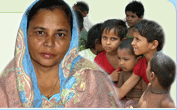|

by
Ameer Hamza Ahmad

In January 2002, amid the usual stories about political crises and terrorism, appeared a news item about a mother who, in sheer desperation borne of poverty, choked two of her children to death because she could not afford to feed them. Most of us probably read it. Many would have felt sorry for the victims and some will have expressed anger over the state’s negligence in providing for its citizens. Almost all of us then turned the page.
One woman, Parveen Saeed from Karachi’s Surjani Town, however, refused to let it go. “The incident with the mother killing her children had a major impact on my life,” she says. “The children had been starving for three days. Isn’t that just terrible?”
Parveen wasn’t rich, and she certainly had no links, beyond a shared humanity, with the woman and her children. But after reading their tragic tale, she felt that it was her duty to do something about the abject poverty she witnessed around her on a daily basis. That was when she decided that she would try and feed those who could not feed themselves. And thus the idea of Khana Ghar, a soup kitchen, was born.
Parveen began Khana Ghar out of her own home and, after a decade of providing subsidised food, she now feeds more than 2,000 people a day. “I realised back then that poverty was one of the root causes of problems in the city. The very poor can’t even afford two square meals a day,” says Parveen. “Hunger is also one of the main reasons for the high crime rate in the city.”
Unlike Saylani Welfare Trust International and the Edhi Foundation, which have massive programmes to feed the hungry, Khana Ghar does not provide food for free. Instead, it charges a token amount of Rs3 per meal, which initially started off at Rs2. “We charge money because we want to discourage the poor from being dependent on free food,” she says. “They feel better once they realise that they have earned their food.”
In the beginning, the idea of paying such a low price for a meal was hard to believe. “Nobody understood it at first. They thought it was a scam or that we were selling substandard food,” Parveen recalls. But word spread and soon there was a queue outside her door as the poor and hungry flocked to her house to get their hands on the cheap hot meals.
Word of Khana Ghar’s successful community work spread beyond the needy, and Parveen was approached by an NGO that helped her procure a plot in Surjani Town’s Khuda Ki Basti to open up a centre. Buoyed by this success, she later expanded her operations by opening up another branch in Korangi No.1.
Parveen says she does not actively look for donations and neither does she seek publicity for her venture. “We do not want to burden people. They already have problems of their own. God helps us get through.”
Instead, funding for Khana Ghar pours in from friends, family and private donors and she is constantly being contacted by people who wish to help out. “We have had people show up at Khuda Ki Basti to look at our operations and they have then offered to help fund us. I constantly offer to provide detailed accounts of how we spend their donations but they just look at me and say that they have faith in me,” says Parveen. “But I am persistent. All the people who donate receive detailed notes and records of their donations. We want to ensure that every rupee is accounted for.”
Thankfully, despite her obvious disdain for self-promotion, her services have been recognised nationally. She was recently honoured by clothing brand Timberland Pakistan on their Earth Day celebrations. She also received Woman of the Nation Award from fashion label Al Karam on Women’s Day. After that, Parveen says, she was inundated with phone calls from people willing to help.
Ramazan is Parveen’s favourite time of the year because it enables her to make a lot of people happy. “In Ramazan, people’s coffers are thrown open and donations are always pouring in,” she says. “We provide iftari and rations to anyone who needs it. Last year, we provided two million rupees worth of rations, and we are hoping to exceed the amount this year.”
Parveen believes that if every family in Pakistan provides a fistful of flour, they can feed the entire nation. “When people come to us and ask how they can help, I only ask them to give us one fistful of flour, that’s it,” she says. “We do not ask for anything more or anything less. That fistful of aata is more helpful to us than a thousand rupees.”
Apart from running Khana Ghar, Parveen also provides assistance to people who cannot afford school books, uniforms and even cloth for funeral shrouds. She also helps out would-be brides and their parents with wedding expenses.
Always looking for new ways to help, she has embarked on another venture through which she provides Rs500 to women, enabling them to set up small stalls in their neighbourhoods. These women are encouraged to sell snacks and other edibles which the neighbourhoods can benefit from. Similarly, she is also helping men purchase carts, fruits and weighing scales to set up their own small businesses. “All we ask them is that if they earn 100 rupees, they should give us half of that. The money we receive is not for us but goes directly into helping others like them.”
But even after a decade of helping people on so many levels, Parveen doesn’t feel that the conditions of the people have improved. “My daughter was recently robbed in an open bazaar in broad daylight. Surjani Town has not had water for weeks. But all we can do is try our best to help those in need,” she says.
And try she does. Who knows? The piece of furniture a bride took with her to her husband’s house may have spared her a lifetime of taunts from her in-laws. Putting food in a needy person’s stomach may have made his day a little less wretched. And maybe, just maybe, a three rupee meal prevented a desperate mother from doing the unthinkable.
Published in The Express Tribune, Sunday Magazine, July 29th, 2012.
http://tribune.com.pk/story/413280/a-fistful-of-flour/
|



